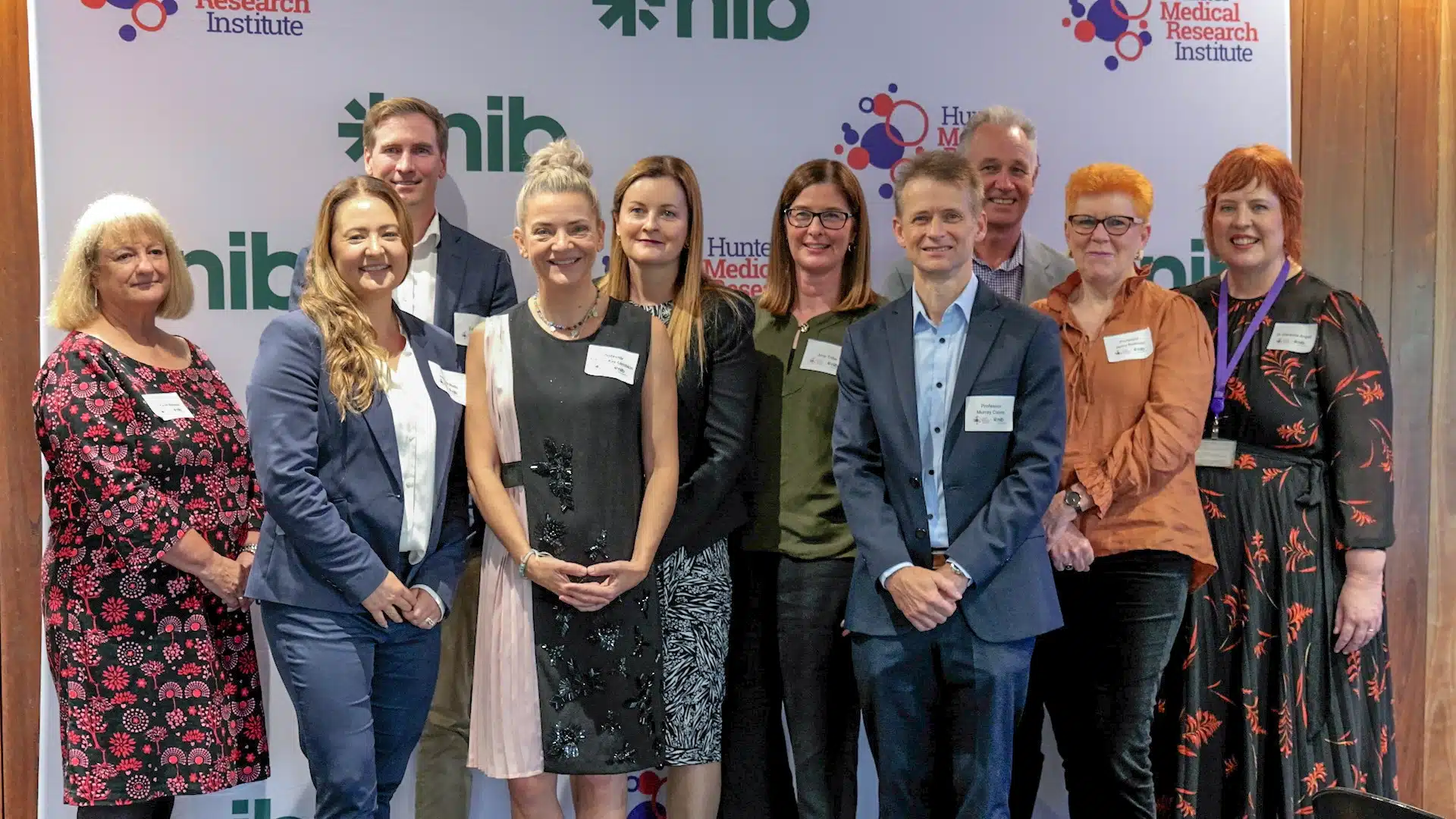
A program that uses genetically guided health information to help people better manage chronic diseases including diabetes, cardiovascular and respiratory conditions, along with two other specialist health programs at the Hunter Medical Research Institute (HMRI) have attracted funding from the nib foundation.
HMRI is a collaboration between the University of Newcastle, the Hunter New England Local Health District, and the community.
With chronic diseases affecting nearly half of all Australians, University of Newcastle Professor, Murray Cairns, from HMRI’s Precision Medicine Research Program, will lead research using genetic data in healthcare for people with chronic conditions. The research is aimed at helping clinicians more accurately tailor treatment for individuals, aiming for better long-term outcomes. Professor Cairns is a biomedical researcher, who focuses on the molecular architecture of conditions such as schizophrenia, heart disease, and cancer.

Two other HMRI programs attracted funding: a ‘shared care’ approach for increasing the engagement of people living with a mental health condition in healthy lifestyle coaching; and improving access to information for patients undergoing knee replacement surgery. The three projects will be completed in 2025 and 2026.
“Chronic diseases affect a very large number of Australians,” Professor Cairns said. “Incorporating genetic data into chronic disease management means more precise, personalised treatment options.” Professor Cairns’ work includes using genetic studies, tissue pathology, human organoid and in silco models to identify modifiable disease risks and improve precision medicine including advanced drug development.
University of Newcastle Professor, Jenny Bowman, from HMRI’s Population Health Research Program, will focus on co-developing a ‘shared care’ approach to increasing the engagement of people with a mental health condition in digitally delivered healthy lifestyle coaching. Professor Bowman said: ‘Low levels of engagement are a significant barrier to realising the potential of behaviour change support to prevent chronic disease and improve health outcomes for this high-risk population group.’

Professor Bowman’s work addresses the inequitable burden of chronic physical disease experienced by Australians living with a mental health condition; including up to a two-fold risk of developing cardiovascular disease and six times greater likelihood of dying from CVD compared to the general population. It is focused on reducing chronic disease risk factors such as smoking, poor nutrition, and physical inactivity, along with equity in healthcare delivery.
University of Newcastle’s Dr Karen Ribbons, from HMRI’s Heart and Stroke Research Program, will lead EXTOKA: Patient education for expectations and goal setting for outcomes following total knee replacement surgery. The program is designed to improve patient education before knee surgery to enable patients to set realistic expectations of surgical outcomes. Dr Ribbons is Project Manager for the Centre for Rehab Innovations (CRI) University of Newcastle. Dr Ribbons’ research focuses on the importance of providing holistic models of care for chronic conditions and following surgical procedures. She is involved in programs that extend beyond physical recovery, and support an evolution of rehabilitation services to enable more tailored service provision to meet individuals’ needs.

“Nearly 70,000 knee replacements are performed in Australia each year, with numbers forecast to escalate over the coming decade. Despite advances in surgical techniques, up to one in five patients are dissatisfied with the outcomes achieved following surgery,” Dr Ribbons said. “Dissatisfaction is in part due to unfulfilled expectations of surgical outcomes. We are aiming to provide education to help patients set realistic goals which will also help target rehabilitation efforts and lead to better long-term results”
Co-design and collaboration drive research impact
nib foundation has provided $1 million in funding over three years1 to the projects. nib foundation was established in 2008 as part of the Newcastle-based nib Group.

“This partnership is critical to advancing research that drives improvements in patient care,” said Venessa Wells, Independent Chair at nib foundation. “We aim to close gaps in healthcare and deliver better health outcomes for the community, including nib members, through the research programs we support.”
Professor Frances Kay-Lambkin, HMRI CEO and Institute Director, highlighted the role of corporate philanthropy in driving health research.
“Philanthropic investment like this is crucial in ensuring research moves beyond the lab and into practice, improving the health and wellbeing of the million people in the Hunter New England community. Private funding plays a key role in driving improvements, helping us bring new treatments, better care models, and progressed patient experiences to life.”
The funded teams will work with HMRI’s Research Impact team, using the Framework to Assess the Impact from Translational Health Research (FAIT) to drive research beyond academic papers and into real-world healthcare improvements.
University of Newcastle Vice Chancellor, Professor Alex Zelinsky, AO, said the University was committed to addressing the range of health challenges faced by its communities.
“The support from the foundation boosts our quest to help our communities lead better, healthier lives and will make a real difference to long term health outcomes.”
University of Newcastle Pro Vice-Chancellor College of Health, Medicine and Wellbeing, Professor Lisa Wood said collaboration was key to solving public health problems and lessening the burden of chronic disease.
“Our university continues to grow from strength to strength as a regional leader in health innovation and collaboration as it works closely with local health districts, HMRI and corporate philanthropic leaders such as the nib foundation. Together, we are making a real impact.”